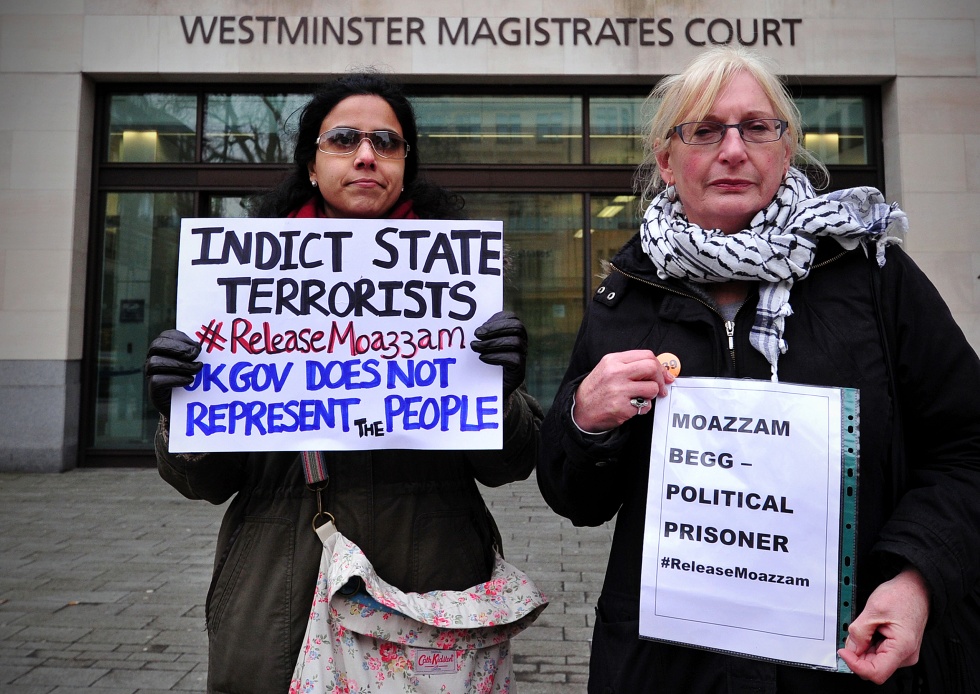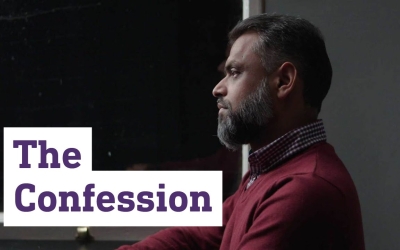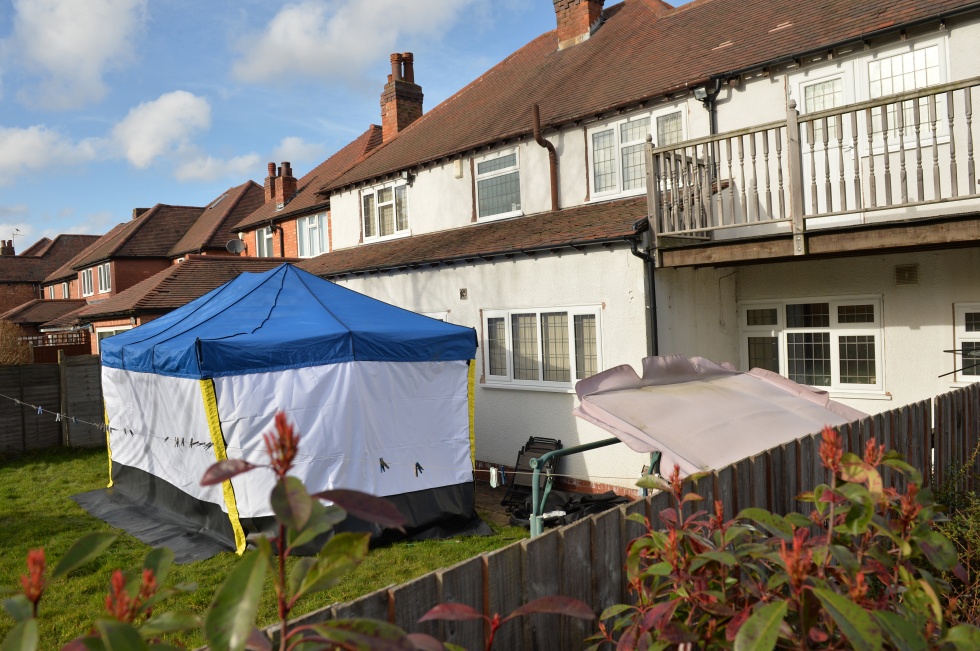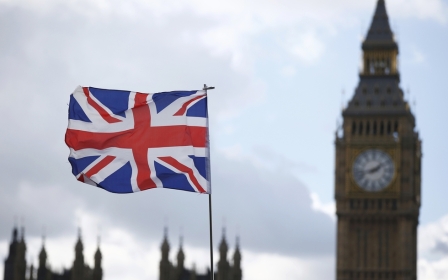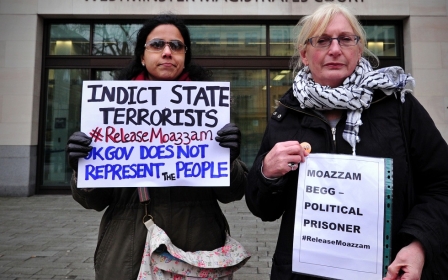My journey through 20 years of British terror laws

On Monday, CAGE, an independent organisation that calls for due process and end to injustices of the “war on terror", has published a report entitled "20 Years of TACT: Justice under Threat" to mark two decades of the Terrorism Act 2000, an important juncture in British legal history.
British lawmakers, police and judges have been making, interpreting and executing new terrorism legislation every year since July 2000.
Since my return from Guantanamo in 2005, I have been documenting and highlighting the effects of Britain's obsession with anti-terror laws not only through stories of countless CAGE clients but very much through my own living experience.
Full time terror suspect
Over the past 15 years, I’ve spoken alongside academics, lawyers and activists at universities and other institutions about my experience and analysis of the war on terror. Whilst my colleagues are introduced to audiences by their job titles, I sometimes get introduced as a "full time terror suspect".
New MEE newsletter: Jerusalem Dispatch
Sign up to get the latest insights and analysis on Israel-Palestine, alongside Turkey Unpacked and other MEE newsletters
I began the arduous process of telling my story and campaigning for others - not only against Guantanamo and British complicity in torture but also anti-terror laws in Britain
People always laugh when they hear this - and it's meant to be ironic - but, I really wish it was just a joke.
In 1999, I had my very first encounter with counter terrorism police and MI5 agents who came to my house to ask me about Farid Hilali, a Moroccan friend from London who wrote to me from the United Arab Emirates asking for legal help after he’d been detained and tortured there - with British complicity.
In February 2000, I was arrested after scores of police officers raided and searched my home. Like me, they did not know what they were looking for, but it was to be the first of many encounters over 20 years.
The charges were dropped but the suspicion continued.
In 2001, when I was abducted in front of my wife and children in Pakistan, the very same MI5 agents who’d come to my home in England were now interrogating me alongside the CIA and US military while I was tortured in Islamabad, Kandahar, Bagram and Guantanamo.
In 2005, I was freed from Guantanamo without charge but, as soon as the RAF plane bringing me back to London landed, I was arrested for terrorism - on the plane. I spent my first night back home in a police cell but the following day I was released without charge and finally reunited with my family.
More laws
However, the next day I received a letter from the Home Office saying that my passport was being revoked under the "Royal Prerogative" - an archaic monarchical power that allows the home secretary to ban a person from travelling due to "security" concerns.
For the next three years, I began the arduous process of telling my story and campaigning for others - not only against Guantanamo and British complicity in torture but also anti-terror laws in Britain which saw, for example, Middle Eastern men detained without trial in HMP Belmarsh prison under emergency terrorism laws.
The day I returned from Guantanamo, my lawyer, Gareth Peirce, had to rush off after meeting me because of an impending court decision over 13 men imprisoned under these laws.
The Crime and Security Act (2001) had been rushed through parliament to allow the home secretary to arbitrarily detain foreign terror suspects without trial following the 9/11 attacks. It took three years but the House of Lords ruled that their detention had been unlawful. The ruling was based on the discriminatory nature of the law and deprivation of the right to liberty.
However, more laws followed, often criminalising the same men who’d been previously exonerated. Secret evidence, often extracted under torture, was sourced from intelligence services of countries like Algeria, Libya, Egypt and Jordan and used in British courts, Special Immigration and Appeals Commissions (SIAC) to place men under house arrest like "control orders".
CAGE spoke to these men and told the stories not only of their British experience but also about where the information came from.
Uncovering war crimes
In 2008, I got my passport back and travelled the world, telling my own story and investigating others. In 2010, I went back to the house from which I was kidnapped in Pakistan and made a film about that night.
I travelled to meet European leaders to seek asylum for Guantanamo prisoners who couldn’t return to their homes for fear of torture - many of whom were from the Arab world.
It was the de-escalating of laws and rhetoric that ended the Irish 'Troubles'. It is now time to finally learn that lesson
In 2012, I gave evidence against the British and US role in the war on terror at a war crimes tribunal in Malaysia alongside survivors of the Abu Ghraib atrocities in Iraq. Prime Minister Mahathir Mohammed attended all the proceedings. President Bush and several US cabinet members were found guilty of "crimes against humanity" based partly on my cross-examination.
To date, that is the only time I’ve ever been in the dock.
During the "Arab Spring" in 2011 I went to Tunisia, Libya, Egypt and Syria and met with victims of the rendition programme and discovered how the Americans and British had worked alongside the dreaded mukhabarat (secret service) with MI5.
Every time I’d travel I’d get stopped and questioned under Schedule 7 of the Terrorism Act (2000), which gives police and some immigration officers the power to hold any person at an airport or port for six hours without any cause of suspicion to determine if the individual could be a terrorist.
I was detained under this law more times than I can remember.
In 2013, after a trip to South Africa, my passport was seized by border police at Heathrow airport. My passport was revoked again under the "Royal Prerogative".
In 2014, my house was raided again by counterterrorism police and I was arrested. I was told that 100 police officers took part at a cost of £1m (over $1m). The charge was that I sent a generator to Syrian rebels and gave them fitness training.
After seven months as a Category A prisoner in HMP Belmarsh and all my assets being frozen, the charges were dropped and I was declared innocent by the same officers who arrested me. I never got my day in court.
Although I haven’t been arrested again since then, my bank accounts have been repeatedly closed without explanation and, despite numerous applications, seven years on I still don't have a passport.
Lessons from the Irish 'Troubles'
The result of this is that I can’t travel anywhere outside of the UK - not with family, not for work, not for pilgrimage and not for a break.
The terrorism laws we now have in Britain are more numerous and invasive than they were at the height of the Irish 'Troubles' when over 3,000 were killed
Despite this, I’ve delivered several rights workshops for CAGE about Schedule 7 explaining how the law is disproportionately applied against Muslims. I tell attendees how I never get stopped at airports anymore. They laugh at the irony.
I’ve also found myself at the receiving end of right-wing think tanks and lobby groups who target me and CAGE for challenging recent laws like Prevent, the counter terrorism strategy that again disproportionately targets Muslims. I’ve even been used as a training case study in an unsuccessful bid to keep our voices off campus.
CAGE has been involved at every level holding the government to account for its deep excesses over the years. We’ve given evidence to the police about MI5’s torture complicity, to an independent inquiry on torture, to the parliamentary Intelligence and Security Committee and the International Criminal Court.
We’ve submitted detailed reports to the government calling for an end to these laws that have only made society less safe and alienated the very people they are targeting.
There is one lesson regarding Britain’s history with terrorism that the government refuses to learn. The terrorism laws we now have in Britain are more numerous and invasive than they were at the height of the Irish "Troubles" when over 3,000 were killed.
It was the de-escalating of laws and rhetoric that ended that terrible conflict. It is now time to finally learn that lesson.
The views expressed in this article belong to the author and do not necessarily reflect the editorial policy of Middle East Eye.
Middle East Eye delivers independent and unrivalled coverage and analysis of the Middle East, North Africa and beyond. To learn more about republishing this content and the associated fees, please fill out this form. More about MEE can be found here.



